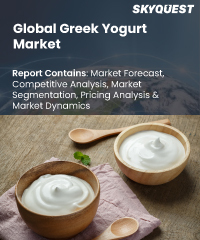
Product ID: SQMIG30I2272

Report ID:
SQMIG30I2272 |
Region:
Global |
Published Date: March, 2024
Pages:
198
|
Tables:
89 |
Figures:
76
The global Greek yogurt market is highly competitive, with numerous players vying for market share and consumer loyalty. Key market players in this segment have established themselves as leaders in the Greek yogurt market through their strong brand presence, extensive distribution networks, and continuous product innovation. To stay competitive, market players are focusing on product differentiation and expanding their product portfolios to cater to evolving consumer preferences. They are introducing new flavors, incorporating natural and organic ingredients, and launching healthier variants with reduced fat and sugar content. Additionally, manufacturers are investing in marketing and advertising campaigns to create brand awareness and promote the benefits of Greek yogurts, such as its high protein content and probiotic properties. Strategic partnerships and collaborations are also common in the Greek yogurt market, with companies forming alliances to expand their geographic reach and tap into new consumer segments. Furthermore, mergers and acquisitions are prevalent as companies seek to enhance their market position and leverage synergies in manufacturing, distribution, and R&D capabilities.
Greek Yogurt Market Top Player’s Company Profile
Greek Yogurt Market
Our industry expert will work with you to provide you with customized data in a short amount of time.
REQUEST FREE CUSTOMIZATIONWant to customize this report? This report can be personalized according to your needs. Our analysts and industry experts will work directly with you to understand your requirements and provide you with customized data in a short amount of time. We offer $1000 worth of FREE customization at the time of purchase.

Product ID: SQMIG30I2272